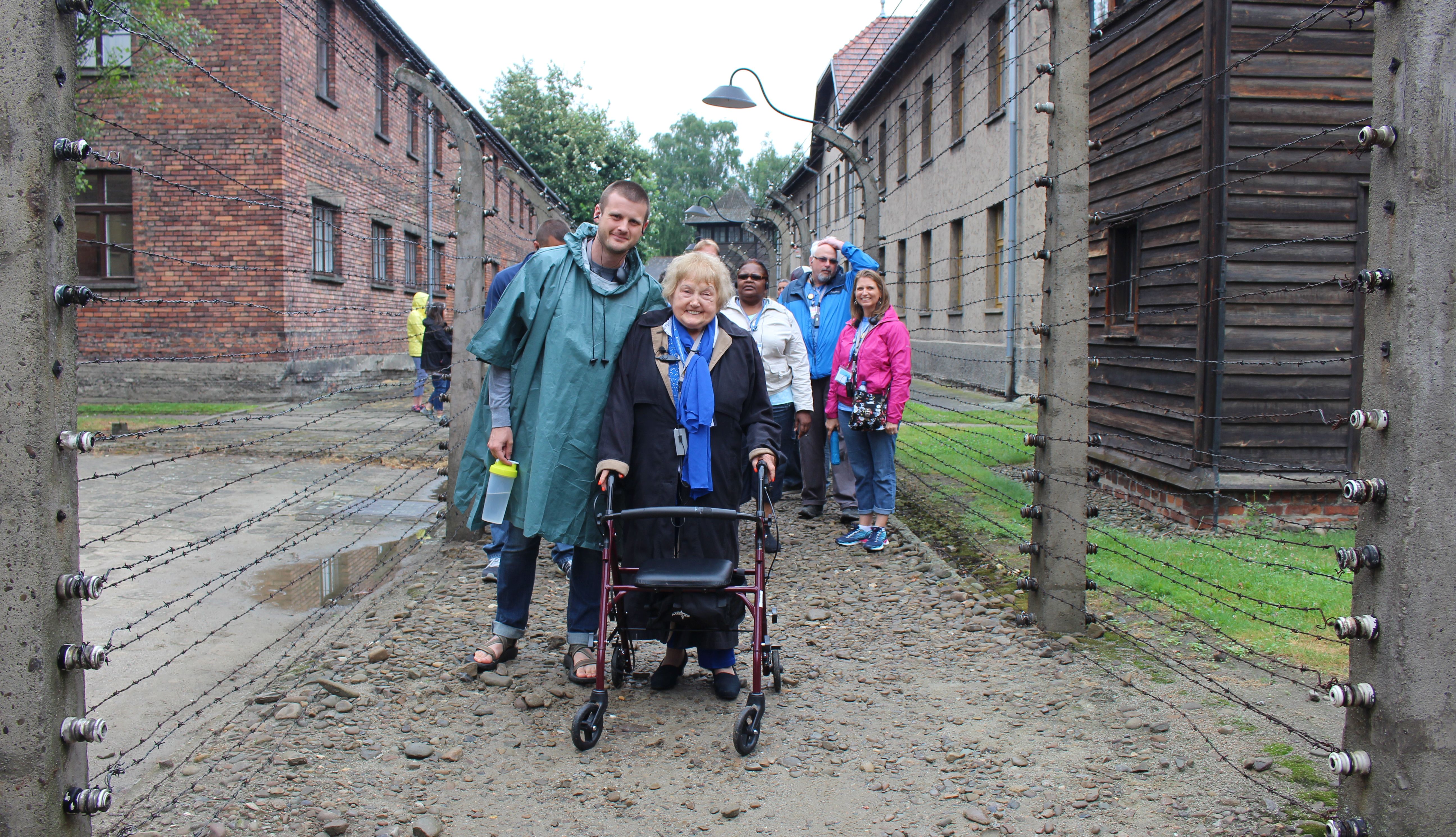Won’t you be my (subversive) neighbor?

“Don’t forget—don’t forget,” said Symon, my guide at Auschwitz as we trudged over rough and uneven stone paths passing row after row after row of chimneys—a ghostly remnant of the barrack heating systems of Birkenau. A gentle rain covered the death camp in a foggy mist. And while Symon of course meant don’t forget the enormity of all the horror that stretched before our eyes, at that moment, he meant “don’t forget” what led to this.
Birkenau didn’t just pop up a few days after the Nazi occupation of Poland. First they had to get rid to the opposition—the artists, the intellectuals, the Partisans, the priests, the politicians—all those power players in society had to first be neutralized in prison camps in order for the Nazis to gain access to the levers that would allow the Final Solution to come to fruition. Laws were needed that restricted and reduced the Jewish people from fully human individuals to things in need of disposal.
In his short book, On Tyranny, Timothy Snyder points out the importance of all the waypoints to societal madness: demonizing the press, the construction of alternative narratives, increasingly restrictive legislation, demonizing experts and knowledge, etc. His message is the same as Symon’s—“don’t forget.”
Symon’s (and Snyder’s) admonition proved prescient for with echoes of black and white photos in my head of Jewish children in ghettos and ripped away from their parents, I returned to the United States to see the New York Times publishing today’s horrors: little brown children torn from their families and stuck in cages while the government sends their parents, unable to even legally petition for asylum, far away—reduced to vermin on our border that needs kept away.
What does a teacher from Indiana do, then? I admired lawyers who dropped everything to go offer representation in immigration courts. People with a kind heart and Spanish language skills ventured south to offer whatever aid they could. Me? I just donated money to the ACLU and felt inept. Was I being a bystander—the same kind that watched his Jewish neighbors lose everything day by day—arms crossed twiddling my thumbs thinking, “oh, how sad, but what to do?”
With these thoughts in mind, I gathered a group of friends together to go to Indianapolis to see Won’t You Be My Neighbor, a fantastic documentary about the life of Mr. (Fred) Rogers. There was a scene in the film where Rogers is upset about racist policies that bar black people from using public pools along with white people. The news showed black people, mostly kids, expelled with water hoses and then kept out with fences (again with these barriers). Fred’s response in Mister Rogers’ Neighborhood was to invite the (black) Office Clemmons to share a small wading pool with him to cool off on a hot summer’s day. As this scene plays out, Rogers looks directly into the camera as he delivers his lines about the importance of two people sharing. Maybe it’s just a trick of my imagination, I could swear that a bit of a mischievous smile curled up on Rogers’ face.
In his quiet way on his (low budget) show for children, Mr. Rogers subverted the narrative. That’s what we can do. Now you’ll see in many of our classroom windows and on our lawns (in Spanish, English and Arabic) “No matter where you are from, we’re glad you’re our neighbor.” We educate a fair number of children of Hispanic families in our community. In response to fears of ICE raids, we just decided to stop keeping any information about immigration status in favor of a position that we’ll educate the children we have—it’s a Millennium Development Goal for the planet’s children—not just those who can legally call themselves American.
All injustice in the world is due to a lack of love—a failure to adhere a maxim present in virtually all ethical systems, both theistic and not: do to others as you would have them do to you. Sympathy is insufficient. If we can’t imagine a different world where we are the person fleeing gang violence and seeking a stable life and good education for our children, then we aren’t loving.
Otto Frank, father of Anne Frank, applied for his family to receive refugee status in the United States and was denied. That’s true for countless Jews who lost their lives because of xenophobia in the United States.
Here we are again.
Bashar al-Assad uses chemical weapons to torture and kill his people. This year we’ve declined to accept more than a dozen Syrians. At our southern border, people flee spousal abuse, gang violence, government violence, and also simply chase the prospect of a better life (like virtually all of our immigrant ancestors). You’ve seen our government’s response.
By all means, send money to organizations working at the border, run for office, go down there yourself if you have some meaningful skill to contribute. All those things are great.
But if you can stay in your city or town and focus on your block—I’d bet there’s someone who needs you to be a good neighbor to him or her. Ultimately, you don’t have to love everyone. No, there’s something much more challenging. You just have to love the people next door, down the street, or on the other side of those proverbial tracks. Love your neighbor—your black, brown, poor, gay, Muslim, Jewish, atheist neighbor. Everything else will follow.
Written by Paul Utterback, CANDLES Auschwitz Trip Alumnus


